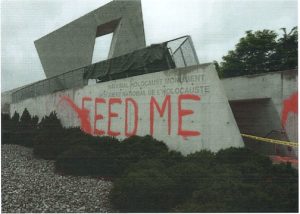Norman Gulko is looking up at his wife. He can’t make love to her, he can only watch as she dances, eyes closed. He wants to hold her, he begins to kiss her. And then he wakes up. And writes it all down.
Gulko, 87, first started dreaming about Florence, his wife, shortly after her death in 1980.
“About two weeks after Flo died, I had a dream of her. It was like she came to visit me. I figured if I recorded it, it’s like having it with me,” he said.
And he did.
Gulko spent 22 years recording his dreams of Florence, which he later learned were bereavement dreams. Some focused on her appearance – her black hair, her dark eyes, others were about her ovarian cancer.
And now, the dreams will be made into a movie – half documentary, half dream sequence, by James Marsh, an Academy Award-winning director.
Gulko’s journey from dreams to documentary started in 1996, when he submitted his diary to Kathryn Belicki, a professor of psychology at Brock University, after watching her discuss bereavement dreaming on a talk show.
“I thought my dreams were very original, but they weren’t. Only when listening to the interview did I realize the recording of them was my way of coping with grief.”
Belicki published a research paper based on his dreams and introduced Gulko to William Domhoff, a professor at the University of California at Santa Cruz with a website devoted to recording dreams. This is where Marsh first learned about Florence’s nighttime visits.
“I was totally captivated by that diary. I saw within it those contours of [Gulko’s] relationship with his wife. The dreams spoke of that. This was someone he cared about and was deeply in love with,” Marsh said.
While reading through Gulko’s dreams, Marsh saw more than just a diary. He saw a love story.
“He didn’t just record any old dream… It was specific, thematic, based on this one person, this one relationship, which was profoundly deep and romantic,” Marsh said. “They’re unusual and purely devoted to one subject, and therefore you have something to work with, you have a structure.”
In 2007, Marsh contacted Gulko through Domhoff.
“We began an e-mail dialogue. [I said], ‘I want to make a film inspired by your dreams, and I don’t know what form it will take.’ He was just open to that idea and receptive to it.”
Because the concept of a documentary through a dream sequence is a unique one, Marsh had challenges raising money for the film, which he is still in the process of raising.
“If I said to a film producer, ‘I want to make a film about an old man’s dreams,’ they’ll say, ‘What the f–k are you doing.’ … The challenge isn’t just creative, the genre of the film is unique, too. It hasn’t been done before,” he said.
In January 2010, he spent 2-1/2 days filming with Gulko, which included interviews, reading out 60 of Gulko’s 150 recorded dreams and following him to the cemetery. Marsh hopes to continue filming in the fall.
For Gulko, the experience was a difficult one.
“It was hard having to relive some of my experiences. One of the fascinating things, this was a very experienced camera crew. After the filming, they turned to me and thanked me for letting them into an intimate part of my life,” he said.
Only while listening to the interviews did Gulko realize why he spent so long recording his dreams.
“[It was] my way of coping with grief. When a man dies, women have girlfriends. Guys don’t have boyfriends. In my case… the minute we got up from shivah, I was completely alone. Through bereavement dreaming, I was speaking to myself about my loss,” he said.






